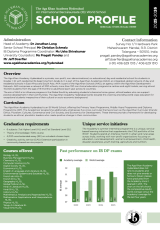Sujana Veeramachaneni: Teacher, Assistant Coordinator, Dorm Parent, Mentor
At the Aga Khan Academy Hyderabad, Sujana Veeramachaneni holds more than her official titles of biology teacher and Assistant Coordinator for the Diploma Programme (DP), science teacher for the Middle Years Programme, and dorm parent. Sujana also ensures her students see her as a friend, mentor and pillar of support.
“They should always feel that I’m there for them, no matter the situation, or condition or time of day,” she insists. “Sometimes I get midnight phone calls! They don’t hesitate to approach me.”
Since the majority of DP students live on campus, “My job doesn’t end in the school,” she explains. “We see them as students, and the dorm is like a home for them – so it’s like seeing them at school and at home – same child, different behaviour. Sometimes it’s difficult to draw a line, because we see them here as well as in the school – so that emotional role is with us, also."
“Of course, I have to draw the line – otherwise maintaining discipline is quite difficult – but at the same time, that line is flexible. It’s not firm – but of course, there is a thin line.”
From her side, Sujana believes that she and other staff can learn from the students’ impressive ability to control their emotions at school. “These are all teenagers,” she reflects. “We see them here, inside and outside. Sometimes, even we lose control – but the students don’t have tantrums in front of their teachers. That’s what I learn from them – how to control our emotions.”
Sujana remembers what she went through at her students’ ages, and understands the pressures they face, especially those approaching graduation from the Diploma Programme, who face multiple deadlines, university applications, and academic and personal challenges. “I always put myself in their shoes,” she emphasises, and shares with her students her anecdotes on how she dealt with stress as a student.
At the same time, she acknowledges times have changed. “This generation is under more pressure – we were not exposed to so many kinds of media or diversions. They are dealing with many things at the same time – compared to them, when we were students, we had less complexity in our lives.”
The demanding IB curriculum motivates Sujana as a teacher, even though her switch to a career in teaching was first supposed to be temporary. Sujana holds an MSc in life sciences, with a specialisation in endocrinology, and a PhD in plant physiology. Her research focused on the physio-biochemical parameters of the post-harvest life of roses, after which she worked in post-harvest floriculture in Bangalore. In 2002 she relocated to Hyderabad and started working as a teacher in an international school.
She was drawn to the demanding and challenging nature of the International Baccalaureate curriculum and in 2013 joined the Aga Khan Academy as a biology teacher. Her career at the Academy has been a learning trajectory: “I’m definitely enjoying the professional development here.” She highlights the different positions she has held over the years, as well as gaining confidence over the years in teaching, helping, and guiding Special Education Needs (SEN) students, and the training, support and resources she has received from the SEN specialist at the Academy.
She also appreciates that the Academy itself is always developing – every year different projects, opportunities and ideas are introduced or planned for the future, and she praises the community service that the school ensures students experience: “It is inculcated in the students – the mission itself is very good and strong.”
The Academy is also always learning from its students; if, for example, some students stand out at drawing or music, the staff will learn from those strengths, and apply what they learn with students in the next batch. The curriculum is reviewed every year, and coordinators and deans take sessions every year to improve and upgrade their skills.
Academically, Sujana especially appreciates the opportunities students have to explore their own interests and to learn independently – “That is the beauty of the Extended Essay.”
“It’s very dynamic,” she explains, and she describes the Extended Essay as a “piece of research work, where the student will find their passion” and submit an essay akin to a mini-thesis.
Because “the curriculum has the scope to identify the strength of the student in different ways” and “the student will design their own labs,” independence and the opportunity to follow one’s own interests is important: “Every student’s choice is different,” she says.
As their teacher, Sujana enjoys the intricacies of guiding the students individually and tailoring her teaching style to their interests and strengths. This year, she is supervising six students, whose self-selected Extended Essay projects explore a range of topics including hydroponics, the greenhouse effect and carbon dioxide concentrations, mushroom cultivation, seed germination, and the effect of music on the growth of plants.
Sujana enjoys being able to show her dynamic, expressive side at the Academy and the freedom of teaching styles and resources that is not always available at other schools. But she finds even more satisfaction in mentoring than in teaching, and it is most rewarding when her students achieve their goals – obtain university admission, get their diploma, or overcome an obstacle when they thought they couldn’t cope, but were “able to achieve something with our guidance.”
She emphasises the need to be adaptable and compassionate towards her students, both for academic and emotional support. “You have to tailor yourself to the needs of the students because some students, you really have to encourage them, motivate them, and some students – at times you have to be firm, strict,” she explains. “I change myself, as per their needs.”
When asked what she envisions for her students’ futures, Sujana replies that she wants them to identify their passions and to continue doing what they like. “I want them always to be confident.
By Natasha Pirani




